Quality Raters are a category of Google employees whose role is to evaluate the quality of search results. Quality raters, also known as Google Search Quality Raters, are people who check the quality of website pages that come up in search results, often in the form of A/B tests.
They do not directly influence the search results, but they give their opinion through the scores they assign to each site. Quality Raters are also used to manually test the effectiveness of Google’s algorithm updates by giving feedback to engineers.
With over 90% market share of search engine usage in the world, Google is constantly innovating. Each year, it conducts hundreds of thousands of tests to verify the contribution of new updates on search and user experience.
To better ensure the usefulness of its additions, Google hires real people to manually verify the quality of search results
This category of Google employees called Search Quality Rater has been around for years and covers over 10,000 people worldwide.
Although the title of this job seems to be simple, these people do a pretty rigorous job within the Californian search engine giant. Let’s discover in this article the world of Quality Raters.
Chapter 1: What does Quality Raters mean and how do they work?
As their name indicates, Quality raters are used to judge the quality of search results. In this section, we will explain what a Quality Raters is, its history and its missions within Google.

1.1) What are Quality Raters?
Many people still confuse the mission of Quality Raters.
Indeed, Quality raters are not Google employees who have the role of inflicting a penalty on websites that try to manipulate the algorithm to get positioned in the SERPs.

Rather, they are employees who are tasked with judging the quality of search results on Google. Although quality raters are employed by Google, they are not directly employed by the big Californian search engine.
Generally, they work as subcontractors for other agencies such as Lionbridge, Leapforce, Butler Hill, etc. They work on behalf of Google through these third-party agencies and mostly operate from home.
They receive sample search results from Google in the form of A/B tests. The job of the Quality Rater is not a full time job. They often work between 10 to 20 hours a week and earn between 12 to 15 dollars per hour.
Their mission is to evaluate and rate the overall or specific search results on Google. Their assessment will then be sent to Google’s engineers so that they can better improve the algorithms.
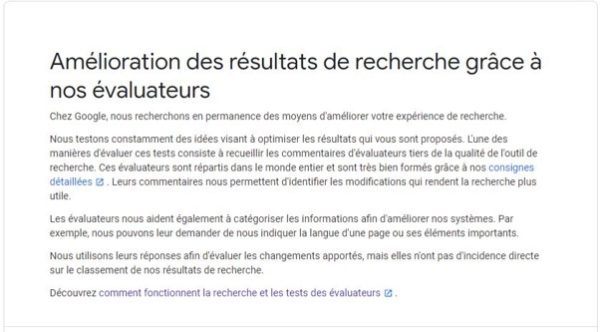
To do this job, there are principles on which the Quality Raters must base themselves to rate the results. All these rules are summarized in a pDF guide guide, which is online and accessible to everyone.
Reading this guide is important for all marketers or webmasters. It will allow you to understand the concept of quality content and the rules on which Google bases its rating of websites.
1.what are the missions of Quality Raters?
Google is constantly modifying its algorithm to better refine the search results and improve the user experience. In addition, Google has branches around the world with different language cultures.
To ensure that the search results it returns to users really match their query, Google recruits Quality raters, who are real people who can analyze with all human faculties.
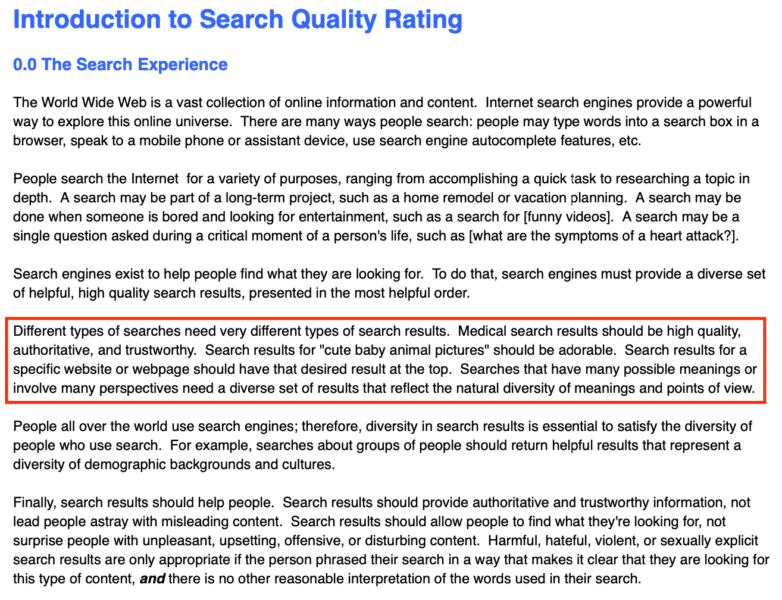
Source Searchengineland
The position of Quality rater requires a good local culture and the mastery of multiple local languages. Sometimes referred to as Internet search evaluators, quality raters are associated with Google and their primary mission is to evaluate the human facts for Google’s algorithm and verify the mathematical formula that indicates the match of search results.
They conduct actual searches on Google and then review the results based on the position each page occupies in the top results. The quality review of the results does not include the modification of the results.
A quality rater does not have the authority to modify the search results and even when they label a page as poor quality, it does not mean that this page will be sanctioned or downgraded from the search results.
It should be noted that Quality raters also intervene in the study of requests for reconsideration following a manual action inflicted by Google on a website.
1.3. The tasks and tools of a Quality rater
The work of a Quality rater requires a number of tasks, namely
- Accessing the Internet via a broadband connection;
- Examine the search results with the online analysis tool of Google (raterhub) ;
- Evaluate online content by taking into account web pages, text, images, etc.
- Analyze the concordance of search results returned by Google;
- Familiarize yourself with Google ads and know the regions and cultures targeted;
- Know how to make analysis reports with Google’s online tool;
- Etc.
The job is to evaluate text, images, web pages and other data contained in the search results. Quality raters log in to a Google online analysis tool from their personal profiles in order to select the assignments to be performed.
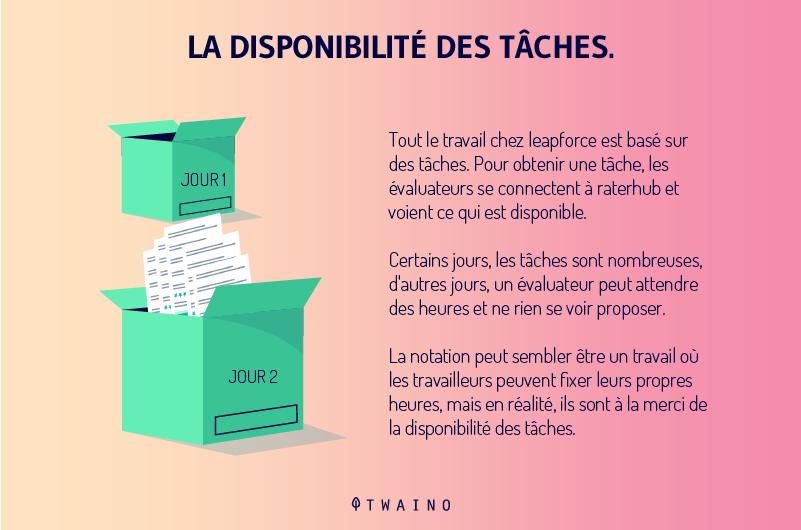 Results are evaluated and scored for relevance. Some results may be rated as “vital”, “useful”, “relevant”, “slightly relevant” and even “irrelevant”. Other results can also be qualified as “Spam” by the quality raters.
Results are evaluated and scored for relevance. Some results may be rated as “vital”, “useful”, “relevant”, “slightly relevant” and even “irrelevant”. Other results can also be qualified as “Spam” by the quality raters.
Of course, the process of evaluating search results by quality raters is more subjective than the work of the algorithm. However, to make this work more precise, Google provides the quality raters with all the guidelines they need to follow to qualify a result.
1.3. What are the skills of a Quality rater?
In addition to the skills that Google requires regarding the rating of search results and the mastery of the online analysis tool, there are other essential skills that can contribute to the smooth running of the activities of a Quality rater
These are :
- Being multilingual being multilingual: Google has spread all over the world and has branches everywhere. Google searches are done in different languages depending on the geographical location of the user.
It would therefore be an asset for quality raters to understand and be fluent in more than one language. Although it is possible for monolinguals to practice this profession, it is nevertheless recommended that Quality raters learn several languages and know enough culture to recognize local references in search results, especially targeted ads. - Self-discipline working from home requires a certain amount of self-discipline. The ability to set goals and put in enough rigor to achieve them is a sought-after quality in quality raters.
In fact, anyone who works from home must be able to self-discipline themselves to keep potential distractions from overtaking the work in order to meet schedules. - Critical thinking the main mission of the Quality rater is to analyze Google search results and qualify their relevance. To do this job, the Quality rater must be a critical thinker in order to objectively evaluate the results and assign a rating.
- Web-savvy web-savvy: Web savvy and the ability to search for relevant information is a quality of anyone who works as a quality rater for Google search results.
1.4. How do Quality Raters work?
To verify the quality of search results, SQRs (Search Quality Raters) must first ask themselves whether the website whose page Google has brought up in the SERPs is trustworthy and has high-quality content
On this basis, they examine all the web pages of the site and the landing page in particular.
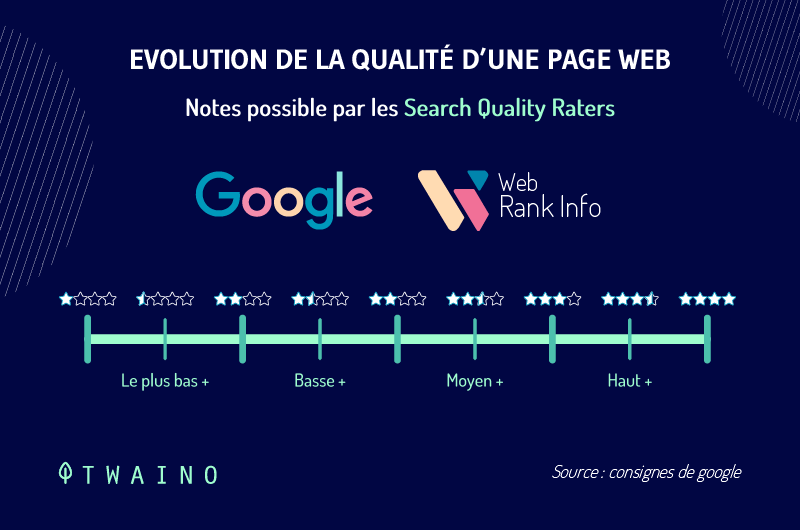
When evaluating the pages that are brought up in the search results, the quality raters have the choice of five different types of ranking. These are:
- High-quality pages that fulfill all their functions and meet users’ expectations;
- High quality pages that cover their purpose and user expectations extremely well;
- Medium quality pages that are not special, but are error-free in the eyes of the quality raters;
- Low quality pages that do not sufficiently fulfill their purpose and offer an inadequate user experience;
- Quality pages that exist only to generate money. These pages have no benefit for the users, on the contrary, they disappoint the visitors and harm the user experience.
To achieve a quality review of a website worthy of the name, Quality raters must evaluate websites according to various criteria namely:
1.4.1. Content analysis and ranking
- The main content this is an area containing all the content of the site. It is generally classified in this area texts, images, or even videos that represent the purpose of the website.
- Additional content this type of content is written to enhance the user experience and meet the expectations of visitors.
- Advertising quality raters analyze a website taking into account the relationship between the main purpose of the website and the advertising it displays on the screen.
1.4.2. The navigation review and the site’s legal notices
In the guide with the guidelines for evaluating websites, the quality raters are asked to look for all the information about the author or manager of the website.
 They also take into account navigational aspects such as page load times, ease of returning to the home page, or even access to individual categories. The ease of contacting the website operators is also an aspect of the evaluation.
They also take into account navigational aspects such as page load times, ease of returning to the home page, or even access to individual categories. The ease of contacting the website operators is also an aspect of the evaluation.
1.4.3. Site Design, Maintenance and Updates
In this part, the analysis consists of checking whether the site is well maintained. The quality raters examine the links and content of the site to see if they are functional and regularly updated. They also analyze the functionality of the site creation and check its compatibility with new web browsers.
1.4.4. The reputation of the site
The examination of the reputation of the website does not only concern the website itself. This part takes into account external and credible analyses of the site in its field.
Quality raters look for footprints of mentions and other external opinions on the website

To better pass their review, Google provides its employees with a lot of advice on how to search for information on the reputation of sites and how to analyze its information.
1.4.5. The rating scale
There are five different stages of website evaluation with possible intermediate increments. The rating scale has the following gradations
- Lowest;
- Lowest; ;
- Medium;
- High;
- Highest.
1.4.6. Scoring by the EAT formula
The EAT formula is one of the most important rules for the evaluation of search results by quality raters. It consists of three key guidelines for quality raters to evaluate websites. These are:
- Expertise;
- Authority;
- Reliability.

In summary, the EAT formula states that all website authors must master their respective fields and be able to transmit their knowledge through high quality content. Secondly, they must be very popular and appreciated by their peers or partners in the field due to their ability to provide trustworthy content.
1.5. Quality raters and Google EAT
Google evaluates the quality of web pages to ensure that the purpose of the page is achieved. A landing page is created to be useful for different purposes. To evaluate search results, Google recommends that quality raters explore the entire site beyond the landing page that came up in the results.
They should identify the author as well as the site operator. PQ page quality evaluations take into account the state of the site.
That is to say, the functioning of the links, the updating of the site or even the loading of the images available on the different web pages, in this case the destination page.
Many analysis criteria are applied to the different categories of landing pages as well as the other pages or areas of the site, i.e. forums and question and answer portals, etc.
To better equip quality raters, Google introduced the EAT (Expertise-Authoritativeness-Trustworthiness) terminology in 2018. EAT literally translates into French gives (Expertise-Authoritativeness-Reliability) and represents the set of standards to be followed by Quality raters when evaluating search results.

The evaluation of a site’s web pages thanks to the EAT side is the way chosen by Google to protect Internet users and spare them from poor quality content that could harm their experience.
Google has created this rule to enable its users to have the best experience by highlighting high quality websites. Adhering to the various Google EAT guidelines allows the search engine to trust and promote certain websites.
Google Search Quality rater generally helps the search engine to measure the quality of search results by taking into account the three EAT guidelines which are:
- Expertise expertise: The content available on the landing pages and on the entire website must be quality content.
Content creators must demonstrate expertise and address the topic explicitly. They must create content that is relevant and meets the requirements of the subject matter without spreading misinformation. Content should provide answers to specific questions while demonstrating knowledge. - Authority google trusts websites that are recognized as competent by others in the same industry and by Internet users.
For Google to recognize a website as authoritative, there must be many citations to that site from other sites or organizations that are considered authoritative.
Google wants sites considered authoritative to be associated with publications from other sites that are trusted by the search engine. - Reliability reliability: The relevance and originality of content and other factors of referencing a site is a factor that can promote trust between Google and that site. It is about all the actions that can produce a feeling of security and that give the certainty that it represents what it claims to be.
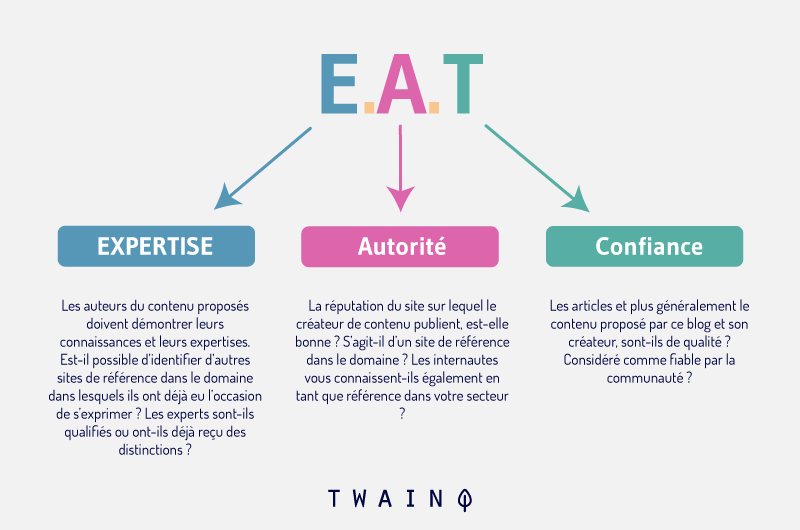
Chapter 2: How to comply with the expectations of Quality Raters?
Unlike robots that are programmed, Quality Raters are human and their different actions can be adapted to different situations
Nevertheless, you can follow the following (04) tips that result from Google’s requirements and guidelines for evaluating websites by Quality raters.
2.1. Be proactive and make your web pages useful for visitors
Make sure that your web pages contain content that will interest visitors and give a good first impression
You should start by clearly defining the objective of each web page and then create content that meets its objectives.

You can also evaluate yourself by doing what the quality raters do. To do this, consider yourself as a consumer, a normal person and judge yourself the quality of the contents of your web pages. Be objective and judge each page of your website as you would any other site you visit.
2.2. put the EAT formula at the heart of your actions
The respect of the three guidelines of the EAT formula is very important to anticipate the evaluation of the pages of your website by the Quality raters. This formula is necessary especially when your site is of type YMYL (Your Money, Your Life).
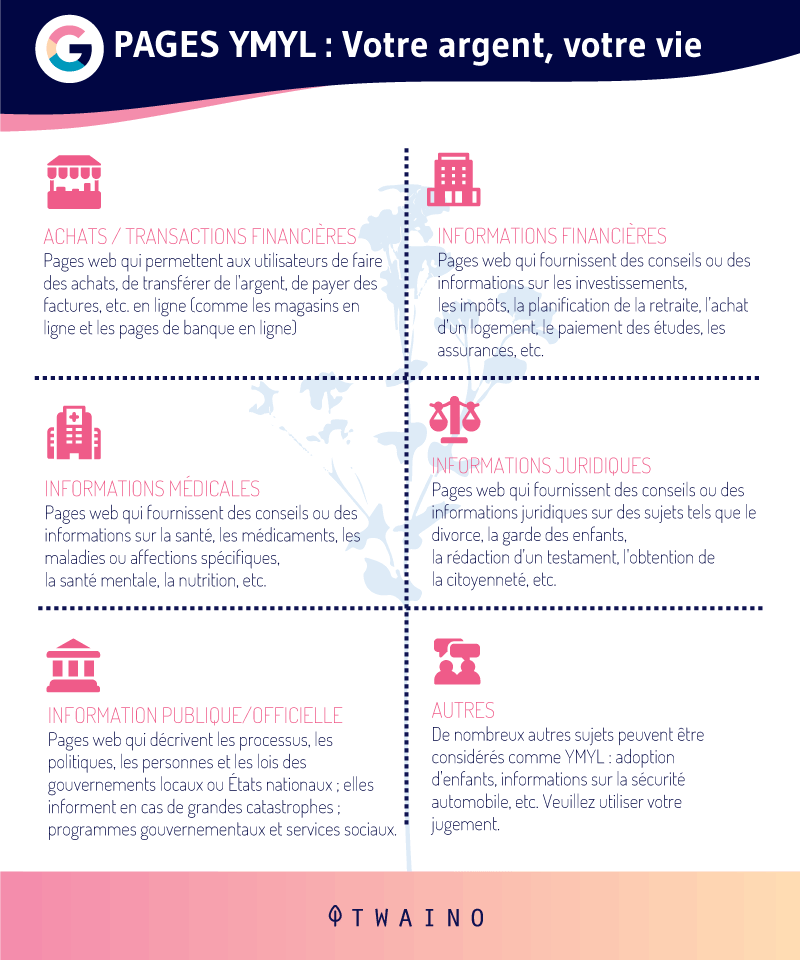
The guidelines (Expertise-Authority-Reliability) must be in the center of your concerns if your site deals with topics that can affect the health, safety or finances of users. Google requires site authors to be an authority in their field and to be trustworthy
2.3. Ensure the quality and accuracy of your content
The main content must be well worked, high quality in order to give a good impression and meet the needs of users. You must extend the actions on the other web pages in order to have high quality contents on your whole site
Another very important element for the evaluation of the quality of your site is its reputation as well as that of its author. So be the best in your field

According to theAgency90 Google regularly modifies the guide that instructs the Quality raters on how they should proceed to the examination of websites. It is therefore important to be attentive to the updates to quickly anticipate and bring yourself up to speed
Summary
Remember that Quality raters are Google employees, in charge of manually examining the destination web pages that come up in the search results. They work on the basis of the guidelines provided by the search engine to objectively rate websites.
The results of the verification of the quality of the websites by the quality raters will then be used by Google’s engineers to improve the updates on the algorithm.
That’s why the knowledge of the Quality raters guide would be an asset for all marketers.
I am sure that if you follow the tips to comply with the expectations of Quality raters, your site will get a good mention when they visit you. However, these tips are just one part of many.
So, leave us your techniques for making a good impression on Quality Raters in the comments!



